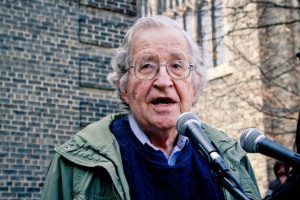John Horgan in Scientific American:
 I don’t really have heroes, but if I did, Noam Chomsky would be at the top of my list. Who else has achieved such lofty scientific and moral standing? Linus Pauling, perhaps, and Einstein. Chomsky’s arguments about the roots of language, which he first set forth in the late 1950s, triggered a revolution in our modern understanding of the mind. Since the 1960s, when he protested the Vietnam War, Chomsky has also been a ferocious political critic, denouncing abuses of power wherever he sees them. Chomsky, who turns 90 on December 7, remains busy. He spent last month in Brazil speaking out against far-right politician Jair Bolsonaro, and he recently discussed the migrant caravan on the show “Democracy Now.” Chomsky, whom I first interviewed in 1990 (see my profile here), has had an enormous influence on my scientific and political views. His statement that we may always “learn more about human life and human personality from novels than from scientific psychology” could serve as an epigraph for my new book Mind-Body Problems (available for free here). Below he responds to my emailed questions with characteristic clarity and force. — John Horgan
I don’t really have heroes, but if I did, Noam Chomsky would be at the top of my list. Who else has achieved such lofty scientific and moral standing? Linus Pauling, perhaps, and Einstein. Chomsky’s arguments about the roots of language, which he first set forth in the late 1950s, triggered a revolution in our modern understanding of the mind. Since the 1960s, when he protested the Vietnam War, Chomsky has also been a ferocious political critic, denouncing abuses of power wherever he sees them. Chomsky, who turns 90 on December 7, remains busy. He spent last month in Brazil speaking out against far-right politician Jair Bolsonaro, and he recently discussed the migrant caravan on the show “Democracy Now.” Chomsky, whom I first interviewed in 1990 (see my profile here), has had an enormous influence on my scientific and political views. His statement that we may always “learn more about human life and human personality from novels than from scientific psychology” could serve as an epigraph for my new book Mind-Body Problems (available for free here). Below he responds to my emailed questions with characteristic clarity and force. — John Horgan
Do you ever chill out?
Would rather skip personal matters.
Your ideas about language have evolved over the decades. In what ways, if any, have they remained the same?
Some of the earliest assumptions, then tentative and only partially formed, have proven quite robust, among them that the human language capacity is a species property in a double sense: virtually uniform among humans apart from serious pathology, and unique to humans in its essential properties.
More here.
